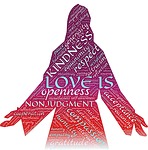Professionally and personally, I have become increasingly interested in the intersection of spirituality and sexuality. My clients and their lives, therapeutic processes, and recovery have also guided me to venture down a path to explore the relationship between spirituality and sexuality.
Recently, at the Texas Association of Marriage and Family Therapy Annual Conference, I attended a presentation by Dr. Warren Holleman, LMFT, a behavioral science professor at the University of Texas MD Anderson Cancer Center entitled “Spiritual Dimensions of Family Therapy”.
Spiritual Dimensions

What does he mean by spiritual dimensions? When we talk about spirituality we mention themes such as mystical, ehtereal, otherworldly. Dr. Warren Holleman would define spiritual dimensions as “the deepest meanings and values by which people live”.
Spiritual Awareness
Dr. Holleman further explains about spiritual awareness:
- Spiritual awareness is what enables us to treat other people as persons, with dignity and respect. Not as things or objects. Not as items on our to-do list. Treat people as I’s and Thou’s and not people as it.
- Spiritual awareness is what enables us to be fully present, wherever we are.
- Spiritual awareness helps us get comfortable with silence.
- Spirituality is not about blind obedience to religious authority or acceptance of cultural traditions. Its about being aware, intentional, and often courageous in challenging the status quo.
What struck me about this list (and there were more, I just couldn’t type fast enough!) was that what you get from spiritual awareness is exactly what you need to have good, connected, satisfying, and intimate SEX!
So, this connection between spirituality and sex goes deeper. Could a person resolve sexual issues, establish a (more) positive sexual identity, improve sexual performance and increase sexual satisfaction by developing themselves spiritually?

Spiritual Needs vs. Sexual Needs
Below is a list in Dr. Holleman’s handouts about concepts and needs related to spirituality. As I read through the list below, I felt that most of these words could also describe the concepts and needs related to sex and intimacy.
Meaning
Love
Compassion
Self-care
Dignity
Community
Wholeness
Holiness
Connectedness
Stewardship
Solitude & Silence
Mindfulness
Serenity
Joy
Wonder
Gratitude
Righteousness
Healing
Integrity
Marriage
Generativity
Nature
Art
Stories
Prayer
A Vocabulary
Faith
I think what came to mind to me was how spirituality has many of the same needs and concepts of our sexual lives. In general, we might not think of these needs in WHAT we get out of our sexual and intimate relationships, but rather what we would LIKE to get out of our sexual and intimate relationships. One would hope that they could describe their sexual identity or sex life as having meaning, full of love, being compassionate, increasing a sense of wholeness and connectedness to your partner. What a gift it would be if you could describe sex as a artful and joyful. Intimate and connected sex leaves you with feelings of serenity, joy, wonder, gratitude, and healing. Sex and intimacy shared in community with your partner or marriage is a beautiful and dignified expression of stewardship and role modeling to future generations.
What about masturbation as an act self-care in in silence and solitude, an opportunity to be connected to oneself and ones sexuality?
I also thought that if you were seeking any of these above concepts in sex and intimate relationships, and on the path to find this, perhaps it would be helpful to focus on exploring the spiritual part of your life.
Could the lack of spiritual awareness be affecting your sex life? 12-Step Groups believe that due to the a “spiritual void” in ones life, an addiction, compulsive, problematic behavior is created to fill it. Only by connecting spiritually to a higher power, is it believed that one can resolve their addiction or compulsion. Is it possible that if you are spiritually disconnected that it could be contributing to your sexual connection?
So seeing as many of us seek (or might now after this blog) sexual experiences that have all these spiritual characteristics, could it be just as valuable to explore the clients spiritual sides of themselves as their sexual side of themselves?
Developing Spiritual Awareness
When I begin working with someone, one of the first things I want to assess is how religion, spirituality, faith and God are present in your life. Usually it is helpful for a client of mine to journal or discuss the answers to the following questions within the first few sessions:
What is the importance of religion and faith in your life?
What is your view and experience of God?
What is your experience of faith?
What is your experience in their faith community?
What is your faith community’s view of one who seeks help of a therapist?
This provides me with the framework on how to move forward attending to the spiritual aspect of a clients life. If someone is struggling with a sexual issues, and through assessment and conversations it comes to appear that that the client is lacking a sort of spiritual awareness or “spiritual intelligence”, it may be appropriate to begin to work on this area for the client.
Dr. Holleman provides a great framework on developing spiritual intelligence and below are some great questions the client may want to begin working on in order to develop their spiritual intelligence.
Spiritual Intelligence (adapted from Daniel Goleman’s Emotional Intelligence)
1. General Spiritual Awareness
What are the spiritual needs and values of individuals, families, and communities?
What are the spiritual dimensions of living and dying, working and playing, health and healing?
What are the spiritual dimensions of human relationships, including families, friendships?
What are the roles that religious stories, practices, and institutions play in addressing the spiritual needs of individuals families, cultures, ethnicities, and economic classes?How does religious language, practices and institutions sometimes make it harder to identify and address spiritual needs and values?
What is the role that helping professionals play in addressing the spiritual needs of individuals, families, cultures, ethnicities and economic classes?
It’s important to have general spiritual awareness in order to have spiritual self-awareness.
2. Spiritual Self-Awareness
What are your own spiritual needs?
What ways do you address (or fail to address) your spiritual needs?
What are your spiritual weaknesses, blind spots, and “hot button” issues?
It’s important to have spiritual self-awareness in order to manage your spirit and recognize the spirit in others.
3. Managing My Spirit
Do you take time outside of work to address your own needs, including your spiritual needs?
Are you comfortable enough with who you are and where you are in your journey that in the interactions with others you 1) don’t drag them into your journey, 2) don’t use them as a means to your ends, 3) are fully present with them, 4) are fully respectful of others spiritual needs, values, and journey?
Are you able to establish appropriate connections and appropriate boundaries around spiritual issues?
Managing your spirit is essential for recognizing the spirit in others.
4. Recognizing the Spirit in Others
Are you aware of the spiritual needs and values of others, from their perspective?
Are you aware of how each individual addresses those needs?
Are you aware of the extent to which individuals understand his or her problems in spiritual terms, as having spiritual dimensions and implications, and as having spiritual solutions?
Recognizing the spirit in others is important for empathy and the ability to address spiritual needs of others.
5. Addressing the Spiritual Needs of Others (Likely for helping professionals, spiritual guides, spiritual leaders)
Are you able to empathize with the spiritual sufferings and joys of others?
Are you able to recognize which spiritual needs and values are relevant to others problems?
Are you able to help others identify or clarify their spiritual needs?
Are you able to help others address their relevant spiritual needs?Are you able to utilize others religious beliefs, experiences, and terminology in talking with them?
Are you able to help clients overcome the confusion and work through the pain that are sometimes caused by religious beliefs, experiences, and terminology?
Are you skilled in using spiritual tools such as spiritual reframes, religious resources, and spiritual rapport?
Are you skilled in rolling with religious resistance?
Are you skilled in recognizing and addressing spiritual abuse?
There are many other ways to develop spiritual intelligence, including story telling, prayer, meditating/mindfulness, and reading any of the below resources. More will be written about in future blogs but those are just a few suggestions to start. If you are seeking out a therapist who is open to exploring spirituality, sexuality, and their intersection in your life, please feel free to contact me using the form below.
Other resources:
Mans Search for Meaning by Viktor Frankl
Does God Exist: An Answer for Today by Hans Kung
Amazing Grace: A Vocabulary of Faith by Kathleen Norris
Emotional Intelligence: Why It Can Matter More than IQ by Daniel Gol
S21: The Twenty-One Skills of Spiritual Intelligence by Cindy Wigglesworth
Spiritual Intelligence: A New Way of Being by Brian Draper
The Future of an Illusion by Sigmund Freud
Spiritual Resources in Family Therapy by Froma Walsh
When Things Fall Apart: Heart Advice for Difficult Times by Pema Chodron
Chi Walking: The Five Mindful Steps for Lifelong Health and Energy by Danny and Katherine Dreyer
Peace is Every Step: The Path of Mindfulness in Everyday Life by Thich Nhat Hanh
True Love: A Practice for Awakening the Heart by Thich Nhat Hanh
Search Inside Yourself: The Unexpected Path to Achieving Success, Happiness, (and World Peace) by Chade-Meng Tan
Care of the Soul: A Guide for Cultivating Depth and Sacredness in Everyday Life by Thomas Moore
Theology of the Body by Pope John Paul II


